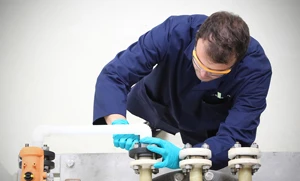
Partner Article
Nexeon to Lead New £1.5 Million SABRE Battery Project
Nexeon - the company developing advanced silicon materials for next generation lithium ion batteries - has had funding approved by Innovate UK for a significant new collaborative research initiative. The £1.5 million Silicon Anode Battery for Rapid Electrification (SABRE) project will develop battery cells with higher energy density, in response to the demand for increased EV driving range.
The SABRE project has been awarded funding from the Faraday Battery Challenge at UK Research and Innovation, and Nexeon will work with its partners, Britishvolt and University College London (UCL), to deliver test cells with a combination of advanced Li-ion cell design and novel silicon anode material.
The project starts immediately, and will extend over twelve months. The partners will exploit the potential for Nexeon silicon anode materials, already shown to improve the performance of Li-ion batteries. Silicon has a greater affinity for lithium than graphite, and this enables the production of cells with increased energy density. Nexeon’s highly innovative silicon material design is achieving a combination of high lithium capacity with low volume change for long cycle life.
In the SABRE project, Britishvolt will apply innovative computer-aided cell design and simulation to accelerate the integration of silicon into the anode design. These tasks will be supported by UCL’s Electrochemical Innovation Lab.
The project will also utilise the new cell assembly capabilities at UKBIC for the fabrication of 21700 cells to test and validate the new cell design.
“We are very excited to lead this important work, and to collaborate with our partners in designing and producing higher performance battery cells”, said Dr Scott Brown, CEO of Nexeon. “This project, and others like it, are important in building a UK-based lithium ion battery capability, and reducing risk in an increasingly competitive supply chain.”
“This is a very exciting work stream and will allow the development of market leading products as we progress on our roadmap to building the UK’s first full-scale Gigaplant”, said Craig Chapling, R+D Programme Manager, Britishvolt. “Collaboration is at the very core of our business model, and this project is another example of our ability to partner for success. On July 6, we hit a major milestone when planning for the Gigaplant was approved, putting us firmly on track to begin construction later this year.”
“The Electrochemical Innovation Lab at UCL is delighted to partner with Nexeon and Britishvolt to translate our cutting-edge research to accelerate the development of advanced batteries to support the transition to net zero”, said Professor Paul Shearing from UCL Chemical Engineering.
This was posted in Bdaily's Members' News section by Terry Nicklin .
Enjoy the read? Get Bdaily delivered.
Sign up to receive our popular morning National email for free.








 Navigating the messy middle of business growth
Navigating the messy middle of business growth
 We must make it easier to hire young people
We must make it easier to hire young people
 Why community-based care is key to NHS' future
Why community-based care is key to NHS' future
 Culture, confidence and creativity in the North East
Culture, confidence and creativity in the North East
 Putting in the groundwork to boost skills
Putting in the groundwork to boost skills
 £100,000 milestone drives forward STEM work
£100,000 milestone drives forward STEM work
 Restoring confidence for the economic road ahead
Restoring confidence for the economic road ahead
 Ready to scale? Buy-and-build offers opportunity
Ready to scale? Buy-and-build offers opportunity
 When will our regional economy grow?
When will our regional economy grow?
 Creating a thriving North East construction sector
Creating a thriving North East construction sector
 Why investors are still backing the North East
Why investors are still backing the North East
 Time to stop risking Britain’s family businesses
Time to stop risking Britain’s family businesses